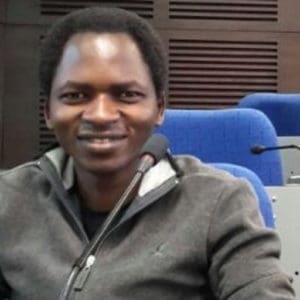An Academic and a Practitioner. Member Spotlight: Sokfa John
Who is Sokfa John

Sokfa is a researcher and mediator. He is currently finalizing projects at the University of Kwazulu-Natal in South Africa, where he has been working on the socio-economic impacts of Covid-19 on sustainable livelihoods for the past two years. He is an associate at the Centre for Mediation in Africa (CMA), University of Pretoria, and will be joining the Centre full time from February 2022 to work on community and track II mediation projects, and digital conflicts. Since completing his PhD four years ago, he has focused primarily on academic work and research. However, he hopes to now divide his time equally between research and practice.
In addition, he has worked on a series of community and public engagement initiatives aimed at bridging the gap between academic work/policy and practice. One of Sokfa’s initiatives is called Afreecan Read, a non-profit literary initiative he founded in 2017 which promotes an African literary culture and pursues social impact through literature. Its online magazine publishes creative works of upcoming and established authors, while other programs aim to build communities and encourage conversations and dialogues on societal issues such as peace, gender based violence and poverty in Africa using literature.
Between the academic and the practical world in peace-building
Sokfa hopes to “move from academic field more towards the practice field“. It is essential for him to combine the advantages of the academic and practical worlds by participating in the work of institutions, providing them with the necessary expertise and participating in working in the field to achieve as much participation as possible and thus acquire different skills.
One of the most prominent obstacles to the relationship between the academic and the practical aspect in the field of peace-building and conflict is the wide gap between academics and practitioners. in his view, “There is a huge gap between the two fields in addition to the misunderstanding and miscommunication between the two sides“.
The academic world is more theoretical and depends on trying to analyze data and to generalize the results on which it is based, which makes sense, but often leads to the difficulty of linking it with the real world. At the same time, the workers on the ground see academics as only thinkers and as people limited to the theories without any kind of practical application of knowledge, unlike them who know what is going on on the ground and who are able to create real change.
Between the two parties, there is a group belonging to the middle and it includes part of the academic aspect and works at the same time as religious or social leaders specialized in conflict resolution and peace-building, but in his opinion, this category is “unable to close the gap between the two fields yet”
In his opinion, there is a great need to find a way to alleviate this gap between the two parties in order to reach the best possible results and combine the advantages of the academic and practical world at the same time. He stated that “the process should be more interactive between the two fields“, therefore academics should occasionally leave their offices and work directly with experts and specialists in the field of practice. Thus, increasing these interactions between the parties can help strengthen dialogue and discussion between them in order to see each side’s point of view and how to harness their knowledge and experience in conflict resolution and peace-building, and making a real impact on people life.
Transdisciplinary Research
Academics should in his opinion “stop seeing the field as only a place to collect data“. They should also pursue transdisciplinary research. This means that they should increasingly involve non-academic stakeholders in the process of producing knowledge to achieve a real impact on people’s lives.
On the other hand, there are several parties related to these two worlds, such as universities and research centres, therefore for him “increase collaboration between all the parties“ by creating programs and events capable of bringing academics together with other experts and practitioners on the field to share experiences, information, and training in order to achieve an effective impact on people’s lives.
Sokfa sees that to achieve peace “to be an academic and practitioner is very interesting but also a very crucial and optional position”, On the one hand, you have a broad theoretical background about the concepts and nature of social conflicts, and you can use different lenses to understand conflicts. On the other hand, you have the experience to apply these theories effectively and not blindly but by using the academic experience you have to achieve the goal you seek. Being an academic and a practitioner at the same time, makes one a potentially highly impactful mediator and peacebuilder.
Article by Yousra Hasona, MBBI Writer
